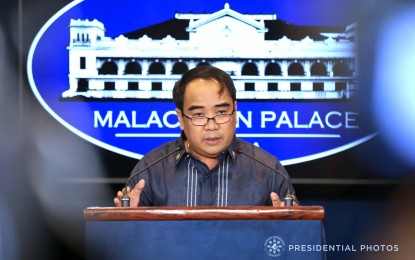
(PNA file photo)
MANILA – Despite the new methodology used in this year's World Press Freedom Index (WPFI) of the Reporters Without Borders (RSF) released on May 4, 2022, the Philippine press remains freer and “extremely vibrant” under President Rodrigo Roa Duterte compared to the previous administrations of former Presidents Benigno "Noynoy" Aquino Jr. and Gloria Macapagal-Arroyo.
“Even with the new method used by the Paris-based RSF in determining each nation’s rankings in the 2022 World Press Freedom Index, the present administration still fared way better than past administrations, a testament to President Rodrigo Duterte’s unwavering commitment to media freedom,” Undersecretary Joel M. Sy Egco, Executive Director of the Presidential Task Force on Media Security (PTFoMS), said in a statement.
Once again, Egco said that RSF’s index proves beyond doubt the media environment in the country has greatly improved after President Duterte came to office in 2016.
According to Egco, RSF’s index is unbiased proof that the state of press freedom is better under President Duterte. He pointed out that the index showed that President Duterte has a better average of 135.8 points counted from 2017 to 2022 with a high of 147, compared to the presidency of the late President Aquino which averaged 142.5 points during his term, reckoned from 2011 to 2016, with a high of 149.
Although the Philippines ranked 147 in this year’s index, RSF has acknowledged that the “Philippine media are extremely vibrant.” RSF also cautioned readers, “In light of this new methodology, care should be taken when comparing the 2022 rankings and scores with those from 2021.”
Egco explained that the country’s ranking in the WPFI has forever been tainted by the Ampatuan Massacre that happened in 2009 during the time of President Arroyo where 32 journalists have been killed, and “it has been very difficult to free ourselves from such tainted past despite the many concrete steps undertaken by President Duterte which have been fully acknowledged by other more reputable international organizations such as the UNESCO (United Nations Educational Scientific and Cultural Organization).”
It should be recalled that it was only in 2019, through the political will of the Duterte administration, that the nation became a beacon of hope for press freedom when Datu Andal Ampatuan Jr and Zaldy Ampatuan, the masterminds of the Ampatuan Massacre, were convicted of 57 counts of murder along with 28 other co-accused, while more than a dozen others were sentenced to 6–10 years for being accessories.
“We at the task force acknowledge that there is more that needs to be done,” Egco said, adding that “Despite our limited financial resources, the government through the PTFoMS has made tremendous and verifiable steps to ensure media safety in the country.”
“Which is why I am calling on all presidential bets to further strengthen and reinforce the PTFoMS for the sake of our journalists who have been toiling very hard in their quest to tell our countrymen the news, bravely facing the pandemic head-on,” he said.
It should be pointed out that the Philippines is not included in RSF's category of countries in the so-called “Red List”, which RSF said indicates “very bad” press freedom situations.
The Philippines is also not included in RSF’s “world’s 10 worst countries for press freedom.” Among the countries red-tagged by RSF “include Myanmar (176th), where the February 2021 coup d’état set press freedom back by 10 years, as well as China, Turkmenistan (177th), Iran (178th), Eritrea (179th) and North Korea (180th).”
Unlike in the past, there was also no country-specific report regarding the Philippines in “RSF’s 2022 World Press Freedom Index: A New Era Of Polarization.”
RSF explained that “In the 180 countries and territories ranked by RSF, indicators are assessed based on a quantitative survey of press freedom violations and abuses against journalists and media, and a qualitative study based on the responses of hundreds of press freedom experts selected by RSF.”
Some writers have openly criticized RSF’s index as untrustworthy and lacking in transparency.
Meanwhile, in observance of World Press Freedom Day, the PTFoMS held several consultative meetings with local journalists in various regions in the past week for the promotion of the safety and security of media workers, in collaboration with the regional offices of the Philippine National Police (PNP).
Culminating the week-long event is the signing into law by President Duterte declaring August 30 as National Press Freedom (NPF) Day in honor of National Hero Marcelo H. del Pilar, the father of Philippine Journalism.
Egco said this historic, landmark measure is one of the Philippines’ biggest contributions to the international community in the promotion of media freedom and safety, along with the creation of the PTFoMS, as the law seeks to raise the consciousness of Filipinos on the importance of the press, their rights and social responsibilities, and the elimination of all forms of violence against the press.
The PTFoMS was created by President Duterte in 2016 as a task force directly under his office to combat the perceived impunity in killings of journalists that transpired during past administrations, a first in the world.
The United Nations proclaimed May 3 as World Press Freedom Day through the efforts of the UNESCO to raise awareness of the importance of freedom of the press and remind governments of their duty to respect and uphold the right to freedom of expression enshrined under Article 19 of the 1948 Universal Declaration of Human Rights
In the recent 2021-2022 “World Trends in Freedom of Expression and Media Development Global Report” released by UNESCO, it highlighted the Philippines as among a very few countries in the world that have undertaken “good practices and positive measures” in the safety of journalists.
The UNESCO report also cited the establishment by the Duterte Administration of “a special task force for the safety of journalists,” now being copied in other parts of the world. (PR)
